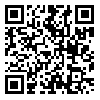Volume 10, Issue 1 (2022)
Health Educ Health Promot 2022, 10(1): 83-88 |
Back to browse issues page
Download citation:
BibTeX | RIS | EndNote | Medlars | ProCite | Reference Manager | RefWorks
Send citation to:



BibTeX | RIS | EndNote | Medlars | ProCite | Reference Manager | RefWorks
Send citation to:
Hashemian M, Hosseini Z, Joveini H, Shahrabadi R, Khosrorad R, Akbari M et al . Application of the Extended Planned Behavior Theory to Predict COVID-19 Preventive Behaviors. Health Educ Health Promot 2022; 10 (1) :83-88
URL: http://hehp.modares.ac.ir/article-5-55126-en.html
URL: http://hehp.modares.ac.ir/article-5-55126-en.html
1- Health Education Department, Sabzevar University of Medical Sciences, Sabzevar, Iran
2- Department of Public Health, Neyshabur University of Medical Sciences, Neyshabur, Iran
3- Educational Psychology, Health Education Department, Sabzevar University of Medical Sciences, Sabzevar, Iran
4- Department of Nursing, Khomein University of Medical Sciences, Khomein, Iran
2- Department of Public Health, Neyshabur University of Medical Sciences, Neyshabur, Iran
3- Educational Psychology, Health Education Department, Sabzevar University of Medical Sciences, Sabzevar, Iran
4- Department of Nursing, Khomein University of Medical Sciences, Khomein, Iran
Abstract: (970 Views)
Aims: Preventive behaviors play an important role in reducing mortality caused by this disease. This study aimed to determine the application of the extended theory of planned behavior to predicting preventive behaviors against COVID-19.
Instrument & Methods: In this descriptive-analytical cross-sectional study, 416 university students were selected and examined through virtual networks through convenience and snowball sampling methods. The data collection tool was developed by the researcher-made questionnaire based on the extended theory of planned behavior. Data were analyzed using descriptive statistics and correlation test and linear regression by SPSS 18 software.
Findings: A positive and significant correlation was observed between the mean of all the studied theoretical constructs with preventive behaviors against COVID-19 (p<0.01). Attitudes, subjective norms, perceived behavioral control, and perception of others' behavior predicted 43% of behavioral intention variance. Moreover, behavioral intention perceived behavioral control and perception of others’ behavior predicted 56% of preventive behaviors variance against COVID-19. Behavioral intention, attitude, perception of others' behavior, subjective norms, and perceived behavioral control had the greatest impact on COVID-19 preventive behaviors.
Conclusion: The extended theory of planned behavior can be used as an appropriate framework in designing educational interventions to promote preventive behaviors against COVID-19.
Instrument & Methods: In this descriptive-analytical cross-sectional study, 416 university students were selected and examined through virtual networks through convenience and snowball sampling methods. The data collection tool was developed by the researcher-made questionnaire based on the extended theory of planned behavior. Data were analyzed using descriptive statistics and correlation test and linear regression by SPSS 18 software.
Findings: A positive and significant correlation was observed between the mean of all the studied theoretical constructs with preventive behaviors against COVID-19 (p<0.01). Attitudes, subjective norms, perceived behavioral control, and perception of others' behavior predicted 43% of behavioral intention variance. Moreover, behavioral intention perceived behavioral control and perception of others’ behavior predicted 56% of preventive behaviors variance against COVID-19. Behavioral intention, attitude, perception of others' behavior, subjective norms, and perceived behavioral control had the greatest impact on COVID-19 preventive behaviors.
Conclusion: The extended theory of planned behavior can be used as an appropriate framework in designing educational interventions to promote preventive behaviors against COVID-19.
Article Type: Descriptive & Survey |
Subject:
Health Promotion Setting
Received: 2021/08/26 | Accepted: 2021/12/10 | Published: 2022/03/30
Received: 2021/08/26 | Accepted: 2021/12/10 | Published: 2022/03/30
| Rights and permissions | |
 |
This work is licensed under a Creative Commons Attribution-NonCommercial 4.0 International License. |





